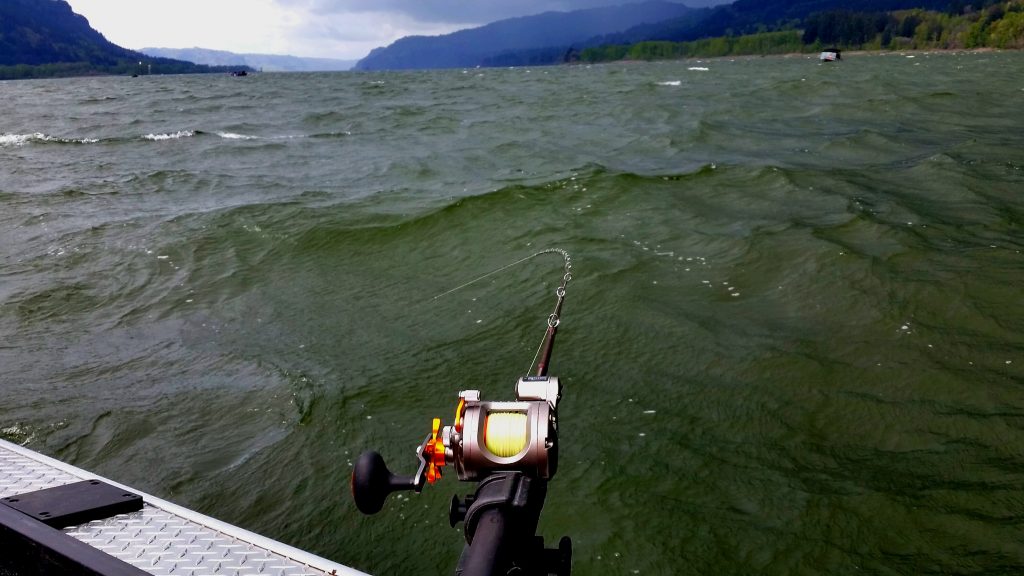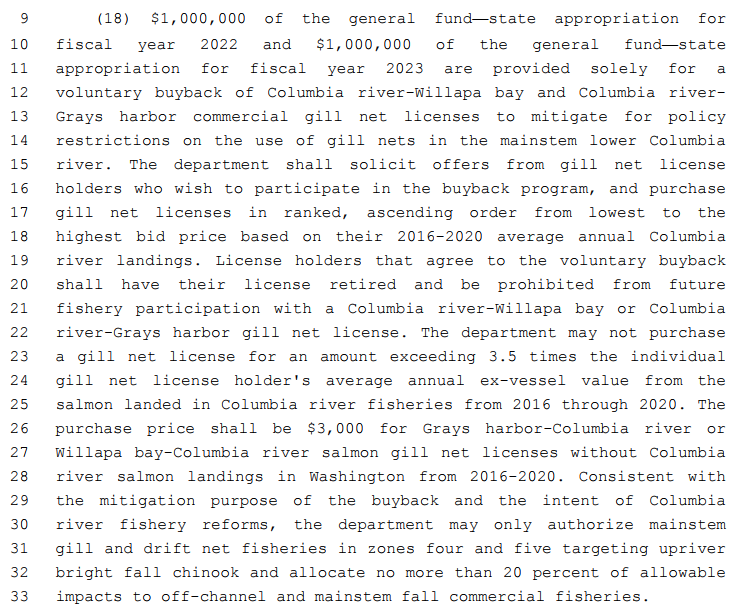
Inslee Again Vetos Voluntary Columbia Gillnet License Buyback Program
For the second straight year, Washington Governor Jay Inslee has vetoed a voluntary nontribal commercial gillnet license buyback program proviso in WDFW’s operating budget, this time after the legislature placed restrictions on Columbia River netting that he opposed.
While Inslee had supported the buyback concept in his own proposed budget, which included $1.1 million to purchase as many as 100 gillnet licenses during the 2021-23 biennium, the final sentence in the $2 million version that was passed by state lawmakers in both chambers last month led him to slash the whole section.

The sentence would have required WDFW “to only authorize mainstem gillnet and drift net fisheries in certain areas of the Columbia River for one particular salmon run based on a set allocation for commercial fisheries,” no more than 20 percent, which conflicts with the agency’s agreement with ODFW, Inslee explained in his veto message out today.
Those “certain areas” are what are known as Zones 4 and 5 – the Columbia from the mouth of the Lewis/Warrior Rock upstream to Bonneville Dam – and the “one particular salmon run” is fall Chinook that are known as upriver brights, a stronger primarily wild stock that returns to the Hanford Reach, Snake River and other locations, with some hatchery production in the Gorge.
The proviso’s restrictions were a response to last September’s 5-4 vote by the Washington Fish and Wildlife Commission that opened the possibility of gillnetting spring and summer Chinook in the lower river, as well as set ESA-listed Snake River wild fall Chinook impact allocations at no more than 70 percent for recreational anglers and no less than 30 percent for the nontribal commercial fleet.
Coho are also netted on the Columbia.
The commission’s move followed its lengthy review of 2013 bistate reforms that moved gillnetters to off-channel areas in the Columbia estuary and prioritized anglers on the mainstem, and drew howls of protest from sportfishing organizations who have been trying to brace up the agreement.
Inslee has other ideas, however.
“In addition, the last sentence potentially limits the department from issuing fishing licenses for other species such as eulachon or shad and from issuing permits for other commercial gear types,” he added in his veto statement. “This may have unknown impacts on other fisheries along the Columbia River. Although I support the voluntary buyback of commercial gill net licenses on the Columbia River, I cannot support these additional provisions. For these reasons, I have vetoed Section 308(18).”
There is little commercial interest in shad, given low market value and other factors – last year, none were reported commercially caught for the first time since 1980 – and eulachon, or smelt, are listed under the Endangered Species Act with only research-level netting occurring; the bulk of the catch of the oily fish is dipped in the Cowlitz River after netting data helps confirm there is enough available for sport harvest.

Immediately after the 2021 legislative session ended last month, CCA Washington called Section 308(18) “the biggest conservation win for salmon and steelhead this legislative session.”
The organization said that because it was passed by senators and representatives, it sent “a strong message following last year’s Commission vote” and represented “an important step forward for harvest reform and the conservation of our salmon and steelhead.”
As the May 18 deadline to sign the operating budget neared, CCA urged members to help “encourage” Inslee to approve what lawmakers had passed.
The buyback was one of just a handful of items Inslee vetoed in the 2021-23 operating budget, far fewer than he did in April 2020 when his red pen ran amok as grim economic forecasts due to the pandemic had the state tightening its belt after lawmakers passed their one-year supplemental budget.
That was when Inslee vetoed a proviso that would have provided WDFW with $573,000 to begin a voluntary nontribal gillnet license buyback program with Columbia, Willapa Bay and Grays Harbor commercial fishermen, arguing it was “premature to move ahead” because it needed to be worked on with licensees and Oregon and he encouraged WDFW to come up with a workable plan with them.
Last year he also vetoed an unfunded mandate from lawmakers for WDFW to convene an independent science review council that would have advised state and tribal salmon and steelhead managers on management decisions. It was panned by some anglers because they saw it as an “additional layer of bureaucracy on top of the multitude of existing state, federal, and tribal scientific review processes,” and WDFW requested it be chopped too.
WDFW had supported the governor’s original 2021 buyback proposal, but not that last sentence tacked on by lawmakers as they amended the operating budget during the session.
“We definitely remain committed to getting our proposal through,” said Ben Anderson, an agency spokesman for Columbia River matters, this morning.
At the conclusion of the session, agency Director Kelly Susewind reported that thanks to budgets passed by the legislature, WDFW was “well positioned for the challenges and opportunities that lie ahead.”
He also recently approved taking the next step on alternative commercial gear on the Lower Columbia by beginning the rulemaking process to allow fishermen to apply to use beach and purse seines and pound nets, “opening these alternative gears for expanded study and use in the river.”
Reaction to Governor Inslee’s veto:
Coastal Conservation Association, Washington
“We are deeply disappointed by Washington Governor Jay Inslee’s veto of a $2 million budget provision for a voluntary buyback of non-tribal Columbia River gillnet licenses connected with Oregon and Washington conservation reforms to transition non-tribal gillnets from the mainstem lower Columbia River. Governor Inslee’s veto follows continued efforts by his Washington Fish and Wildlife Commission (WFWC) appointees to undo fishery conservation reforms and drastically increase non-selective commercial gillnetting in the lower Columbia River in conflict with the conservation needs of wild and ESA-listed Columbia River basin salmon and steelhead populations.
“In his veto message to the legislature, Inslee claimed that budget proviso language limiting mainstem gillnetting “conflicts with Washington’s agreement with the state of Oregon on the management of commercial gillnet fisheries on the Columbia River.” However, the budget proviso would have brought the two states into much closer alignment compared to the recent WFWC policy decision, which conflicted with the polices of the State of Oregon across every single fishing season. Despite receiving aletter from a coalition of conservation and sportfishing groups last fall urging him to engage with Oregon Governor Kate Brown to undo this decision and restore a common approach to fishery conservation between the two states, Governor Inslee has done nothing to signal his opposition to the WFWC policy and the widespread conflicting policies that have resulted in the eight months since the decision was made.
“After years of frustration with the actions of WDFW and the WFWC around the management of Columbia River fisheries, our elected legislators rightly sought to reverse the WFWC decision and hold unelected, activist members of the Fish and Wildlife Commission accountable. Governor Inslee’s veto only emboldens these rogue Commissioners as they seek to push their radical agenda and further undermines Washington’s leadership on salmon recovery issues. We are hopeful that Oregon Governor Kate Brown, the Oregon Fish and Wildlife Commission, and legislators from both states will continue to reject these radical policies and we will support their efforts to bring leadership to this critical issue.”
Trout Unlimited
“We are extremely disappointed to learn today that Governor Jay Inslee chose to use his line-item veto authority on the operating budget to veto a proviso critical to the protection of ESA-listed Columbia River steelhead and salmon. This action follows a 5-4 vote last September when the Washington Fish and Wildlife Commission opened the door to the reintroduction of commercial non-tribal mainstem Columbia River gillnetting despite the overwhelming objections of TU, other sportfishing and conservation groups, and many Washington State legislators.
“Restoring gillnets to the mainstem is a step backward for rebuilding depleted stocks of salmon and steelhead and is inconsistent with the recovery plan goals for the numerous distinct populations of wild salmonids listed under the ESA, including summer steelhead. With the lack of studies and understanding about the gillnet release mortality impacts on by-catch, including the sub-lethal effects, particularly to wild summer steelhead, we feel this veto will only perpetuate the downward trend of ESA-listed steelhead and salmon in the Columbia River.”
Northwest Sportfishing Industry Association
“Unfortunately, Governor Inslee’s statement about supporting a buyback and concerns surrounding conflicts with Oregon sows confusion, when a veto did just the opposite. The proviso would have ended chaos and brought the two states’ policies closer than they have been in some time. Saying one thing and doing another sends troubling signals – to the legislature, to the angling public that funds much of the conservation mission at WDFW, and to the WDFW Commission. Notably, when the Governor vetoed the buyback provision last year the Commission promptly voted to continue their roll back of the Columbia River Reforms. We also find the veto inconsistent with Governor Inslee’s 2016 letter to the Commission. Hopefully, the Governor has a plan to put the original reforms back on track, and quickly.”
